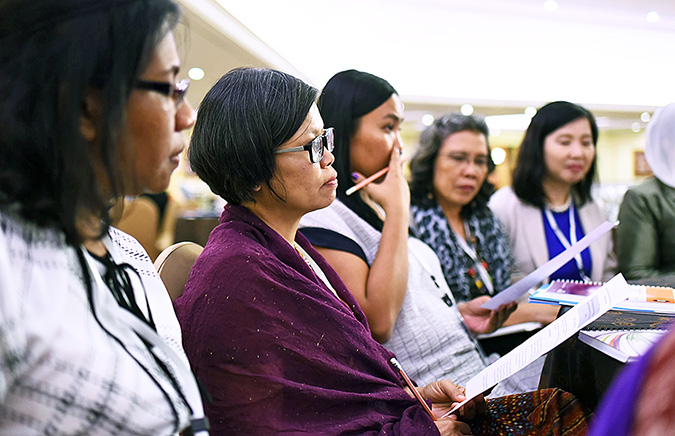To Ensure Peace for Women, Include Them in Peace Negotiations, Experts Say
Date:
Author: Yoomi Jun
Bangkok, Thailand – National plans to ensure women’s security will not succeed unless women who have experienced conflict are invited to participate in deciding those plans, said participants at an Asia-Pacific meeting on how to carry out their commitments as United Nations Member States.

Government representatives, civil society advocates, academics and experts from 17 countries gathered in Bangkok on 11-13 July for The Asia-Pacific Regional Symposium on National Action Plans on Women, Peace and Security. The meeting, organized by UN Women and supported by Government of Japan, discussed the progress and challenges of countries in carrying out United Nations Security Council resolution 1325 and other resolutions that call for increasing the participation of women in efforts to maintain and promote peace and security. The United Nations has encouraged member states to adopt National Action Plans to implement the resolutions; as of May 2016, nine Asia-Pacific countries have done so.
Empowering women is key to the ability of societies to recover from conflicts, said participants at the Bangkok meeting. “Strong and independent women are powerful actors in accelerating economic recovery after conflict, increasing sustainability of the peace process,” said Roberta Clarke, Regional Director of UN Women Office for Asia and the Pacific and Representative in Thailand.
Participants said that peace processes cannot be representative nor be effectively carried out unless female victims of violence, including those from the villages, also sit at the negotiating table. In Myanmar, more women must be allowed to participate in the current negotiations between the government and ethnic rebel groups on ending the civil war, said Mi Kun Chan Non, a leader of the Mon Women’s Organization and a member of the Alliance for Gender Inclusion in the Peace Process.
In Asia and the Pacific, special attention also must be given to women’s participation and needs in the prevention of, and humanitarian relief for, climate change-induced disasters, said Sharon Bhagwan-Rolls, Executive Director of femLINKPACIFIC, an NGO in Fiji. The Asia-Pacific region is the one most affected by climate change, she said.
“It is critical for us to make sure there is a commitment between WPS [women, peace and security] and humanitarian action,” she said. “If we are not applying UNSCR 1325 to humanitarian action, we are going to see women sidelined in participation, preparedness, protection, and relief and recovery processes.”
The need to involve grassroots women in formulating National Action Plans was echoed by Hideo Fukushima, Deputy Chief of Mission at the Japanese Embassy in Thailand. Japan did this from the very beginning of the process, he said. “Japan is working for the society where women shine,” he said, quoting Prime Minister Shinzo Abe.
Better coordination in government and bigger budgets were among other recommendations made at the meeting. Gettie Sandoval, Former Undersecretary of the Office of the Presidential Adviser on the Peace Process in Philippines, which in 2014 became the first country in the region to adopt a National Action Plan, said that the plans can succeed only if central and local governments work closely together and align their agendas.
Many countries do not devote enough funds to carry out the effort. Paivi Kannisto, UN Women’s Chief of Governance and Security, said governments were encouraged to use 15 per cent of any resources received from the United Nations Peacebuilding Fund to support gender equality efforts. The fund aims to prevent countries from relapsing into violent conflict.
About the author
Yoomi Jun
KOICA Communications Associate for UN Women Asia and the Pacific
Phone: +66 99 3254766 Email: [ Click to reveal ]